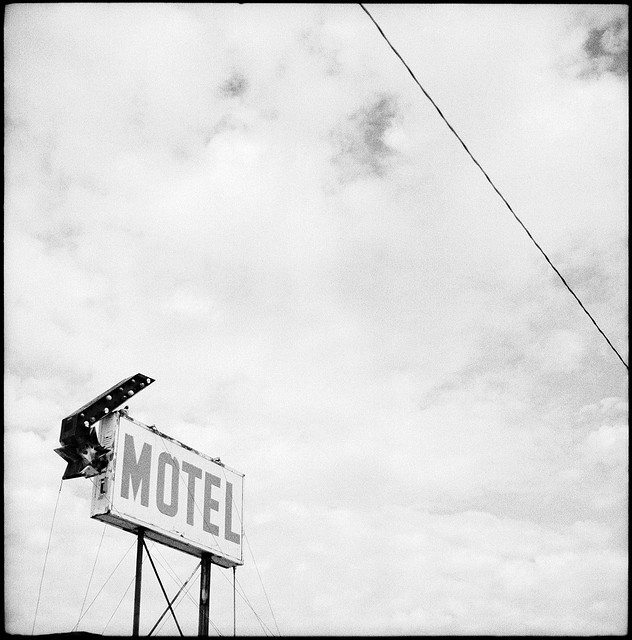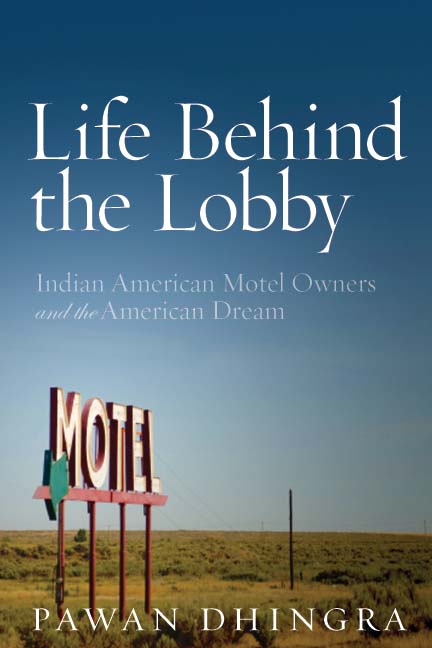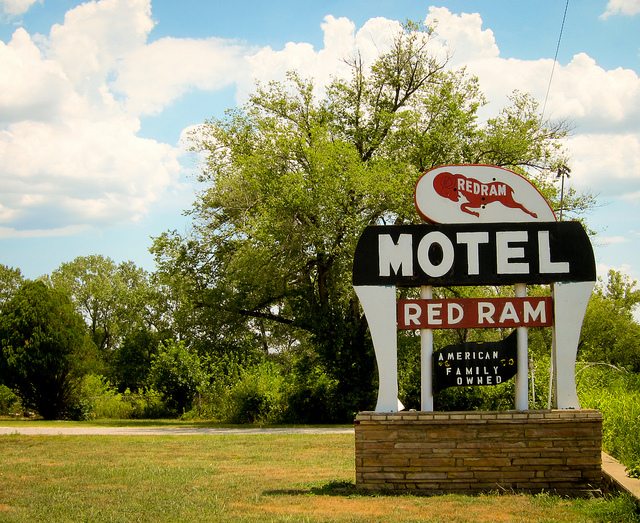
Pawan Dhingra’s comprehensive look at a U.S. phenomenon:
Life Beyond the Lobby: Indian American Motel Owners & The American Dream
Chances are that anyone who has stayed in motels in the last decade has stayed in at least one owned by an Indian American, even if that is not apparent to the guests. Indian Americans own almost two million rooms with property values of well over $100 billion.
About a third of Indian American owners have independent properties, typically all lower budget. Indian Americans own about 60 percent of budget- oriented motels generally and over half of some motel chains. Of franchise motels built in the last few years, those owned by Indian Americans comprise more than 50 percent. The motels can be found nationwide. They are in major cities, suburbs, and exurbs, and off interstate highways. This accomplishment is all the more remarkable when one considers the small segment of India from which most owners descend. Seventy percent of Indian American owners share the same surname, Patel, although they are not all related.
They come from the Indian state of Gujarat, either directly or from elsewhere in the diaspora (for example, the United Kingdom or East Africa). And a majority originate not just from Gujarat but from within a 100- mile radius of the central region of the state. Patels alone own about one- third of all the nation’s motels. It is no wonder that politicians and the news media often celebrate them.
Contrary to popular perception, Patels did not own motels before emigrating. In fact, they arrived with few resources, entered the motel industry at the lowest level, and typically generated sufficient income to provide for their families. Although often familiar with English, many are not fluent. And they do not live and work in ethnic enclaves that serve co- ethnics, as is often the case for immigrant entrepreneurs. Instead, with motels, they are at the nexus of the expanding highway system and the growth of leisure time— quintessential markers of American life.

Citizenship, Neoliberalism, and Entrepreneurship
Political rhetoric and media discourse suggest that Indian American motel owners have attained full citizenship, that is, economic opportunities, respect of culture, and political opportunities equal to the majority (Glenn2002; Maira 2009). This suggestion contrasts with more common depictions of Indian and other Asian Americans as foreigners (Lal 2008; Tuan 1998) and is challenged in the next section, but it can shape impressions of them and the nation. This presumed full citizenship results not just from the economic progress of Indian American motel owners but from the means of their progress: small business ownership.
Small business owners embody neoliberal ideology, which in turn helps them gain acceptance.
Along with increased privatization and a limited government that promotes free markets, neoliberalism values self- sufficiency (Melamed 2006; Ong 2006). Ong (2003) writes that within today’s neoliberal state, “increasingly, citizenship is defined as the civic duty of the individual to reduce his or her burden on society” (p. 12). Entrepreneurship and small business are inherently part of neoliberalism (Harvey 2005). A neoliberal state frames its citizens as entrepreneurs, that is, as people who take care of their own needs without relying on public assistance (Brown 2006). Entrepreneurs are perceived as being self- initiated, autonomous, creative, and able to handle ambiguity, all desirable traits for citizens generally (Swedberg 2000).
Family- run businesses represent neoliberal aspirations more than other types of businesses. In addition, they frequently employ or otherwise support other immigrants, often kin of the owners, and so absolve the government from a responsibility to assist newcomers, even as their labor is needed to support the economy (Reddy 2005). In other words, Indian American moteliers have attained their level of industry dominance because of their hard work, and they receive praise because of their perceived ideological fit with the nation.
The bootstrap, Horatio Alger– style aspect of this narrative not only serves Indian Americans’ public image but also benefits the image— not to mention the economy— of the nation. Their success and resulting “acceptance” represent what is possible in the United States. In turn, the notion of U.S. exceptionalism is strengthened (Pease 2000). The United States appears as a morally just country when its immigrants and minorities attain full citizenship. This also makes the nation’s global economic and political hegemony appear benign and even beneficial, rather than imperial, which furthers the United States’ global status (Melamed 2006). With this public front, inequalities that the United States inflicts on its own minorities and on other nations can more easily be ignored or explained away.
Uncovering Inequalities
The rise of Indian Americans in the motel industry has national and international implications. As immigrant business owners, they become framed publicly within the rhetoric of the American dream, regardless of their economic and social realities (Abelmann and Lie 1995). But how much do their actual professional and personal experiences fit this model? Framing moteliers’ success solely within neoliberal doctrine and as conferring full citizenship obscures the reality of their tenuous position within the hierarchies of capitalism, race, gender, economic and political opportunity, and culture.
Economic recessions and other challenges to leisure or business travel (for example, the September 11, 2001, attacks) create severe financial burdens for owners. For instance, at a 2010 convention held by AAHOA—a professional association representing almost exclusively
Indian Americans (at whose past conventions the noted politicians spoke)—about half of the hundreds of owners at a plenary session indicated they would seriously consider leaving the industry completely given how poor the economy had been.
Furthermore, a wide variety of individuals with diverse experiences comprise the Indian Americans who dominate the motel industry. Although some own middle- budget and higher- budget establishments, Indian Americans most commonly own lower- budget establishments and as such do not fit the standard depiction of Indian Americans as elite professionals (for example, physicians, venture capitalists, hedge fund managers).
Owners of lower- budget motels and their families oft en work with limited or no staff , struggle to make ends meet, go without health care for themselves and their workers, and lack social prestige in their local community even while the ethnic group as a whole is praised.
They worry about the proliferation of motels and oversaturation of the market. They refer to themselves as laborers at the mercy of customers, franchisors, and/or the government.
Very low-budget motels have become associated with prostitution, drug dealing, and other crimes (a stereotype that is often misplaced and that ignores similar activities within upscale motels). Cities depend on motels to house otherwise homeless persons (Jain 1989).
Indian American owners of middle- and higher- budget properties have not encountered the same degree of marginalization. Still, they complain of a lack of autonomy from the franchisors, as seen, for example, in the franchisors’ collection of fees that are not based on the owners’ earnings (see Mathew 2005). Female motel owners cite disrespect in their daily negotiations with vendors.

A number of Indian Americans also note that franchisors give them due attention but still seem to view them differently from other owners—as immigrants rather than “ordinary” Americans. Such problems, although not debilitating, lie in sharp contrast to the presumably equal treatment granted to successful entrepreneurial immigrants.
In addition, customers may still avoid Indian-owned motels across all budget levels. Indian American motels can be racialized as dirty, poorly run, and managed by “untrustworthy foreigners.” “Patel motels,” a common industry phrase, have been maligned as smelling like curry (Lal 2008). Tied to the professional challenges have been the personal hurdles facing owners and their families, in particular the large percentage in lower- budget establishments. Not only did they emigrate from a country halfway around the world, but they also moved repeatedly across the United States looking for a good deal on a motel.
The search for an affordable property could land them off interstate highways, in rural areas, or in commercial districts, apart from the support provided by co-ethnic networks. In these settings, they can face cultural and racial schisms with local residents. When they do reside near fellow co- ethnic motel owners, relationships may be compromised by business tensions.
Also, living inside their motels contradicts the standard notion of a home. As a result, some owners and their families have felt resigned to their business and personal lives rather than enthusiastic about them. Sometimes their businesses perform poorly and their family life suffers, and although most families find ways to respond to these problems, a few regret having migrated to the United States.
So, Indian American motel owners often have a precarious relationship to the image of the small business owner promulgated by Al Gore and Newt Gingrich and instead resonate with the depictions in popular film. By focusing on those in lower- and middle- budget motels, Life Behind the Lobby moves away from a depiction of Asian depiction of Asian Americans as only highly successful professionals.
(Excerpt from Life Beyond the Lobby: Indian American Motel Owners & The American Dream reproduced with permission from Stanford University Press)
Related Articles
